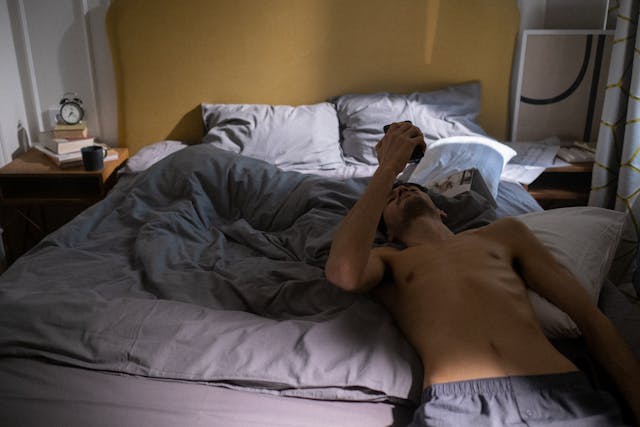The Struggle to Fall Asleep: Why Sleep is More Difficult Than Ever
In our fast-paced, hyper-connected world, quality sleep seems to be more elusive than ever.
We’re constantly bombarded with stimuli, juggling work, family, and social obligations, all while our screens keep us wired long past sundown.

If you’re searching for the easiest way to get to sleep, you’re not alone.
Millions of people are tossing and turning, desperately seeking a good night’s rest.
[ > Be sure to read to the end where you learn the struggles Thaddeus, founder of Primalhacker, faced with his sleep – and solutions that worked for him < ]
The Epidemic of Sleep Deprivation
Poor sleep has become a widespread epidemic, impacting our health, happiness, and overall well-being.
Studies show that chronic sleep deprivation is linked to a laundry list of ailments, including:

-
Obesity:
Disrupted sleep patterns can wreak havoc on your metabolism, making weight management a real struggle.
-
Heart Disease:
Lack of sleep increases the risk of high blood pressure, heart attack, and stroke.
-
Mood Disorders:
Sleep deprivation is strongly correlated with depression, anxiety, and irritability.
-
Impaired Cognitive Function:
Foggy thinking, poor memory, and difficulty concentrating are all hallmarks of sleep debt.
Beyond the obvious health consequences, sleep deprivation also sabotages our productivity, creativity, and ability to connect with others.
It’s no wonder we’re all searching for the easiest way to get to sleep and reclaim our rest.
The Primal Disconnect
Our ancestors didn’t have to worry about Netflix binges or late-night emails.
They lived in tune with the natural rhythms of day and night, enjoying deep, restorative sleep.

The modern lifestyle, with its artificial lighting, constant stimulation, and sedentary habits, has thrown our sleep patterns out of whack.
But here’s the good news: you can reclaim your natural sleep rhythms and find the easiest way to get to sleep by tapping into your primal instincts.
The Primal lifestyle offers a blueprint for optimizing your sleep, from diet and exercise to stress management and environmental factors.
In the next section, we’ll delve deeper into the common roadblocks to sleep and explore how the Primal approach can help you overcome them.
We’ll uncover the secrets of effortless sleep, so you can wake up feeling refreshed, energized, and ready to conquer your day.
Understanding the Roadblocks to Sleep
Before we dive into the easiest way to get to sleep, let’s shine a light on the common culprits that are robbing us of our precious rest.
Identifying these roadblocks is the first step towards reclaiming your sleep sanctuary.
The Modern Sleep Saboteurs

-
Stress and Anxiety:
In our go-go-go society, stress has become a constant companion.
The relentless pressures of work, finances, relationships, and even world events can keep our minds racing long after we’ve crawled into bed.
Stress triggers the release of cortisol, a hormone that can disrupt sleep patterns and leave you feeling wired and tired.
-
Blue Light Exposure:
Our smartphones, tablets, and computers emit blue light, a type of light that suppresses melatonin production.
Melatonin is a hormone that regulates our sleep-wake cycle, signaling to our bodies when it’s time to wind down.
Late-night scrolling or binge-watching your favorite shows can trick your brain into thinking it’s still daytime, making it harder to fall asleep.
-
Poor Sleep Hygiene:
Inconsistent sleep schedules, late-night meals, and stimulating activities before bed can all throw your sleep rhythm off balance.
A chaotic sleep routine can leave you feeling groggy and unrested, even if you manage to get a decent number of hours of shut-eye.
-
Dietary Factors:
Caffeine and alcohol are notorious sleep disruptors.
While a morning cup of coffee can jumpstart your day, an afternoon latte can keep you tossing and turning at night.
Alcohol might initially make you drowsy, but it can interfere with deeper sleep stages and leave you feeling less refreshed in the morning.
-
Medical Conditions:
Sometimes, sleep problems are a symptom of an underlying medical condition, such as sleep apnea, restless leg syndrome, or chronic pain.
The Primal Advantage
While modern life throws plenty of sleep disruptors our way, the Primal lifestyle offers a counterbalance, helping us realign with our natural sleep rhythms.
By adopting Primal practices, you can create a sleep-conducive environment both internally and externally.
In the next section, we’ll unveil the Primal approach to sleep and share 10 powerful hacks to help you unlock the easiest way to get to sleep.
The Primal Approach to Sleep: Reclaim Your Rest
The Primal lifestyle offers a holistic solution to sleep problems, addressing not just the symptoms but also the root causes of poor sleep.
By embracing the wisdom of our ancestors and syncing with our natural rhythms, we can rediscover the easiest way to get to sleep and wake up feeling truly refreshed.
The Primal Sleep Philosophy
At its core, the Primal approach to sleep revolves around aligning our lifestyle with our evolutionary heritage.
Our ancestors lived in tune with the natural light-dark cycle, moving their bodies during the day and winding down as the sun set. They:
- ate whole, unprocessed foods,
- avoided artificial stimulants, and
- spent time outdoors,
- soaking up the sun’s rays.
This primal way of life naturally regulated their sleep-wake cycle, promoting deep, restorative sleep.
By adopting these principles, we can tap into our innate ability to sleep soundly and wake up feeling revitalized.
The Primal Blueprint for Better Sleep
Here’s how the Primal lifestyle supports optimal sleep:

-
Diet:
A Primal diet emphasizes whole, nutrient-dense foods like meats, fish, eggs, vegetables, fruits, nuts, and seeds.
These foods provide the building blocks for healthy sleep, including magnesium, tryptophan, and melatonin.
By avoiding overly processed foods, refined sugars, and excessive caffeine, you can create a stable internal environment that supports restful sleep.
-
Movement:
Regular physical activity is crucial for sleep regulation.
Engaging in Primal-inspired workouts, such as strength training, sprinting, and outdoor activities, can help you expend energy, reduce stress, and promote relaxation.
However, avoid intense exercise too close to bedtime, as it can temporarily increase cortisol levels.
-
Stress Management:
Chronic stress is a major sleep saboteur.
Primal practices like meditation, deep breathing exercises, spending time in nature, and fostering social connections can help you manage stress and cultivate a calm mind.
-
Light Exposure:
Sunlight exposure during the day is essential for regulating your circadian rhythm.
Aim to get at least 30 minutes of sunlight exposure each morning, ideally without sunglasses.
In the evening, put on your blue light blocking glasses, dim the lights and avoid screens to signal to your body that it’s time to wind down.
-
Sleep Environment:
Create a sleep sanctuary that is cool, dark, and quiet.
Invest in blackout curtains, earplugs, and a comfortable mattress and pillows.
Keep your bedroom free of clutter and distractions to create a peaceful atmosphere that promotes relaxation and sleep.
By embracing these Primal principles, you can create a lifestyle that naturally supports restful sleep.
In the next section, we’ll delve into specific Primal sleep hacks that can help you fall asleep faster and wake up feeling refreshed.
Your Roadmap to Deeper Sleep: 10 Primal Hacks
Now that you understand the Primal philosophy behind sleep, let’s get practical.
Here are 10 actionable hacks, inspired by our ancestral wisdom, to help you unlock the easiest way to get to sleep and wake up feeling like a well-rested cave dweller.
1. Optimize Your Sleep Environment
Transform your bedroom into a sleep sanctuary by:
-
Keeping it Cool:
Aim for a temperature between 60-67°F (15-19°C), as a cooler room signals to your body that it’s time to rest. -
Blocking Out Light:
Invest in blue light blocking glasses and blackout curtains or an eye mask to create total darkness, which is essential for melatonin production. -
Minimizing Noise:
Use earplugs or a white noise machine to drown out any disruptive sounds.
2. Embrace Evening Relaxation Rituals
Wind down before bed with calming activities like:
-
Screen-Free Time:
Avoid electronic devices for at least an hour before bed, as the blue light can disrupt your sleep. -
Warm Bath or Shower:
The drop in body temperature after a warm bath can help you relax and prepare for sleep. -
Gentle Movement:
Light stretching or yoga can release tension and promote relaxation.
3. Adjust Your Diet
Fuel your body with sleep-supportive foods and avoid sleep disruptors:
-
Limit Caffeine:
Avoid caffeine in the afternoon and evening, as it can linger in your system for hours. -
Say No to Late-Night Meals:
Finish your last meal at least 2-3 hours before bedtime to allow for proper digestion. -
Focus on Whole Foods:
Prioritize nutrient-dense foods like vegetables, fruits, and healthy fats, which can help regulate blood sugar and promote restful sleep.
4. Soak Up the Sun
Expose yourself to sunlight during the day to regulate your circadian rhythm:
-
Morning Sunlight:
Aim for 30 minutes of sunlight exposure each morning, ideally without sunglasses. -
Evening Darkness:
Dim the lights in your home and avoid screens in the hours leading up to bedtime.
5. Manage Your Stress
Implement stress-reduction techniques into your daily routine:
-
Meditation and Slow Breathing:
These practices can calm your mind and reduce cortisol levels. -
Spend Time in Nature:
Connect with the natural world to reduce stress and promote relaxation. -
Prioritize Social Connection:
Nurturing relationships with loved ones can provide emotional support and buffer against stress.
6. Consider Natural Sleep Aids
If you’re still struggling to sleep, explore natural supplements:
-
Magnesium:
This mineral plays a role in muscle relaxation and can help calm the nervous system. -
Melatonin:
This hormone regulates sleep-wake cycles and can be helpful for resetting your internal clock. -
Herbal Teas:
Chamomile, valerian root, and lavender tea can promote relaxation and sleep.
7. Track Your Sleep
Use a sleep tracker or journal to monitor your sleep patterns and identify areas for improvement.
8. Don’t Force It
If you can’t fall asleep within 20 minutes, get out of bed and do something relaxing until you feel sleepy again.
9. Stick to a Consistent Sleep Schedule
Go to bed and wake up at the same time each day, even on weekends, to regulate your body’s natural sleep-wake cycle.
10. Consult a Sleep Specialist
If your sleep problems persist, don’t hesitate to seek professional help from a sleep specialist.
Thaddeus’ Sleep Journey: A Primalhacker’s Quest for Deeper Sleep
Even seasoned Primalhackers like Thaddeus (founder of Primalhacker) continue to explore new ways to optimize their sleep.

Thaddeus, a long-time practitioner of the Primal lifestyle, has been on a quest to improve his deep sleep for years.
Despite overcoming chronic insomnia with blue-light blocking glasses and inner emotional work, he found himself consistently waking up around 2 a.m. and struggling to achieve truly restorative sleep.
The Deep Sleep Challenge
Deep sleep, the most restorative stage of sleep, is essential for physical repair and rejuvenation.
It’s during this phase that our bodies release growth hormone, repair tissues, and bolster our immune system.
Thaddeus recognized the importance of deep sleep and set out to find a way to increase it.
He experimented with various biohacks, tracking his sleep patterns and seeking innovative solutions.
The Power of Biohacking
Biohacking, the practice of using science and technology to optimize bodily functions, can be a powerful tool for improving sleep.
Thaddeus embraced this approach, exploring different strategies to enhance his deep sleep.
One of the most effective biohacks he discovered was the use of the Soltec Health System.
Research suggests that magnetic waves at night can improve sleep quality, and boost deep sleep.
Thaddeus’ Biohacking Experiment
Thaddeus began incorporating the Soltec Health System into his evening routine.
Over time, he noticed a significant improvement in his deep sleep duration and quality.
He found himself waking up feeling more refreshed and energized, with increased mental clarity and focus.
[ > Learn how the Soltec Health System boosted deep sleep for Thaddeus here < ]
Lessons from Thaddeus’ Journey
Thaddeus’ experience highlights the importance of ongoing experimentation and biohacking to optimize sleep.
Even if you’ve already made significant progress, there may be additional steps you can take to achieve even deeper, more restorative sleep.
Here are some key takeaways from Thaddeus’ journey:
-
Don’t settle for “good enough” sleep:
If you’re not waking up feeling fully refreshed, there may be room for improvement. -
Embrace biohacking:
Explore the latest research and technology to find what works for you. -
Track your progress:
Use sleep trackers or journals to monitor your sleep patterns and identify areas for improvement. -
Be patient and persistent:
Improving your sleep takes time and experimentation. Don’t give up if you don’t see results immediately.
Thaddeus’ story is a testament to the power of the Primal lifestyle and biohacking to unlock the full potential of our sleep.
By following his example and continuing to explore new frontiers, we can all achieve deeper, more restorative sleep and wake up feeling truly alive.
Embrace the Primal Way and Wake Up Refreshed!
By now, you’ve got a treasure trove of Primal-inspired strategies to help you conquer sleep problems and achieve the best sleep of your life.
It’s time to ditch the sleeping pills and embrace the natural, effective solutions that have stood the test of time.
Your Personalized Sleep Solution
Remember, there’s no one-size-fits-all answer when it comes to the easiest way to get to sleep.
Experiment with the Primal hacks we’ve shared and discover what works best for your unique body and lifestyle.
Perhaps you’ll find that a magnesium supplement and a warm bath before bed are your magic combo for drifting off to dreamland.
Or maybe an earlier dinner and a tech-free evening ritual will do the trick.
The key is to listen to your body, observe your sleep patterns, and make adjustments as needed.
The Power of the Primal Lifestyle
Embracing the Primal lifestyle isn’t just about improving your sleep; it’s about optimizing your entire well-being.
By prioritizing whole foods, natural movement, stress management, and a connection to nature, you’ll unlock a cascade of benefits, including:
- Increased energy levels
- Improved mood and mental clarity
- Enhanced physical fitness
- Stronger immune function
- Reduced risk of chronic diseases
So, why not give the Primal approach a try?
It might just be the easiest way to get to sleep and wake up feeling like a whole new person.
Share Your Sleep Success Story!
We’d love to hear about your experiences with the Primal approach to sleep.
Share your tips, challenges, and triumphs in the comments below.
Together, we can build a supportive community of Primal hackers who are committed to reclaiming their rest and waking up refreshed.

